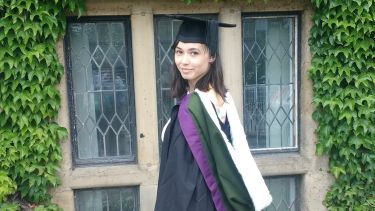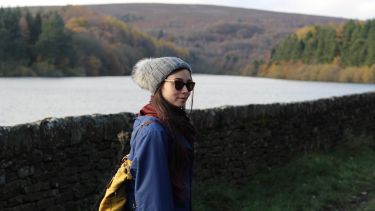I’m grateful that I had the opportunity to develop emotional & cultural intelligence as well as engineering knowledge during my time at Uni

Read: Our interview with Emma
Why did you want to be an engineer?
My main interests at school were biology and physics, so from the age of 16 I knew that I wanted to find a career path that was interdisciplinary. During Sixth Form I got the opportunity to take part in the Engineering Education Scheme which was run by the Engineering Development Trust at the time. Many schools in my region entered a team who worked with a local company to come up with solutions to real-life engineering challenges. As a six-month programme, it was the first time I had experienced a complex project with many different areas to take into consideration. During our time working with a maritime civil engineering company on the challenge of designing a passenger boarding bridge for a ferry terminal, I was introduced to the concept of business requirements, project management, data management, and report writing. I found the mixture of technical knowledge and real-life application in a fast-paced collaborative working environment to be really exciting, and in hindsight this was probably the first time I felt the pull of engineering in industry as opposed to pure scientific research.
Why did you choose to study at the University of Sheffield and the Materials Science Department (MSE) in particular?
Even before applying for a place, I was aware of the great reputation the MSE department at the University of Sheffield has, but I remember being particularly taken with how friendly and interesting the lecturers and student ambassadors were on interview day. At that point I was already fascinated by the field of biomaterials; it was considered extremely niche at my school, so the willingness to explain their own research and basic principles that I had yet to learn really made me feel like I would be welcome and valued.
Tell us a little bit about your role at Jenx - how has your experience at Sheffield helped your career?
I am a Project Development Engineer at Jenx, which is a local company that designs and manufactures medical devices for children with special postural support needs. My role involves overseeing projects that cross multiple departments - this includes processes from new product introduction and post-market surveillance on the product side of things, to international regulatory compliance, sustainable development, and IT/data protection projects from a business development perspective. I also manage some of our international accounts which adds to the cross-cultural aspect of my job. My first role at Jenx was in the export department; knowing that I wanted to stay in Sheffield and work in the medical device industry, I took a temporary job that wasn’t related to my degree in the hope that it would lead to new opportunities.
Studying Materials Science and Engineering at Sheffield helped my career because we had the opportunity to study such a range of relevant modules. Specific modules I took such as Medical Devices and Seminars in Bioengineering helped me understand that there were alternative career paths to scientific research at a time when I was starting to feel that lab work wasn't for me. More broadly speaking, my course also prepared me very well for working across boundaries which is now such a big part of my day-to-day life; from coordinating information and plans between different departments, to explaining technical product information or medical device regulations to customers based thousands of miles away. I would say there were many important parts of university life that prepared me for this. Even if I hadn’t specialised in biomaterials, MSE is extremely interdisciplinary and we would often share modules with bioengineering and aerospace (engineering) students. Being encouraged to work with people from different technical backgrounds was helpful because you aren’t able to make assumptions so easily – a hugely important lesson. We also had quite a few group projects which helped with communicating technical concepts and working with people who had a range of personalities and backgrounds. Finally, many students on my particular course came to Sheffield from different countries so adapting our working, learning, and communication style was something we all learned to do quite early on. I’ll always be grateful that I had the opportunity to develop emotional and cultural intelligence as well as engineering knowledge during my time at university.
Tell us a little bit about your new book - what inspired you to write it and do you identify with any of the women you feature?
I was commissioned to write 'Female Innovators Who Changed Our World: How Women Shaped STEM' because the publishing company knew I had an interest in both writing and STEM outreach. There were already books on the market about women in science or engineering, and many that were aimed specifically at younger children. However, we wanted to create an overview of women's history for adults that crossed disciplines and had direct relevance to the development of our world. There are countless women who achieved so much in their STEM fields, and both my commissioning editor and I wanted these stories to have as much exposure as possible. On top of this, I was writing throughout the lockdowns and also during the Black Lives Matter movement. These two events were hugely sobering and changed my vision for the book considerably as I embarked on the journey of re-educating myself. If I'm honest, I still don't think the range of women in the book is diverse enough and I was always conscious of the women whose stories have not been shared. One of the reasons is almost certainly due to the biased record keeping of cultures that failed to recognise women's achievements. I'm also conscious that as an English speaker, the resources I am able to read paint a very western-centric picture so I do encourage the international community of women in STEM advocates to keep discussing people whose stories have not yet crossed borders.
My career doesn't even begin to compare with the women whose lives are featured in the book but I can certainly relate to the cultural fluidity exhibited by Kin Yamei who, in the 1880s became the first Chinese woman to earn a medical degree in the USA. I have Asian heritage so find her ability to take knowledge, culture, and working practices across borders really inspiring.
What has been the highlight of your engineering journey so far?
Every one of my visits to a Special Educational Needs (SEN) school has been deeply moving, and reinforced the impact what postural support can have on the quality of life of those who need it. But my favourite memory has to be a STEM outreach session we did at a SEN school in Barnsley. The idea was simple. Who better to suggest fun design updates to our equipment than the young people who use it? We were blown away by their creativity, and one little boy announced that we should put cotton wool on the sandals so his feet could be kept warm - who doesn't love fluffy slippers?!
What are your ambitions for the future?
Having advocated for homeless, rootless, and vulnerable people all of my adult life, I'm fascinated by the intersection between industry, social justice, and sustainable development. Networking between sectors is vital for making positive changes in our city, and I hope to carry on doing my small part liaising between organisations, universities/schools, and charities. I have a personal interest in environmental policy, and plan to spend the coming years and decades assisting with building incremental changes as part of the great things already happening in various industries and organisations across Sheffield. It's definitely a long-term project.
What’s your favourite memory of Sheffield?
We had a great lab session in first year that involved making composites out of chocolates and sweets to engineer the strongest material. My closest friends were all on my course so it was fun splitting into groups and having that competitive element (even if we weren't allowed to eat the chocolate). My now husband was also a fellow course mate so I have particularly fond memories of our time studying MSE at Sheffield!
What’s the best thing about being an engineer?
The joy of problem solving. I'm told that I was one of those children who constantly asked 'why'. Whatever your discipline, I think training as an engineer is a fantastic starting point to being able to answer those questions, as well as thinking in a way that has huge potential to work on some solutions to the world's many challenges.
We interviewed Emma in February 2022.

International undergraduate scholarships
We are offering scholarships of £2,500 for each year (subject to a 60% average) of your undergraduate degree. The maximum value is £10,000 for four-year programmes.



